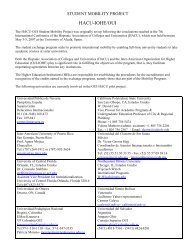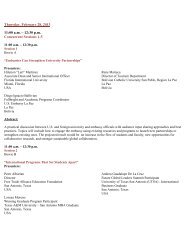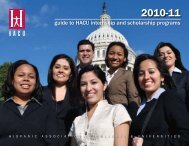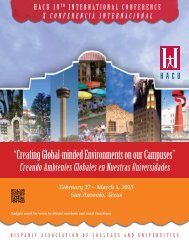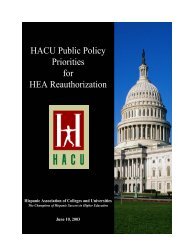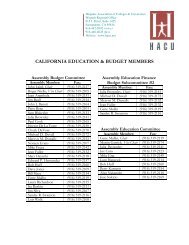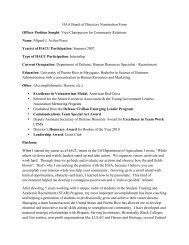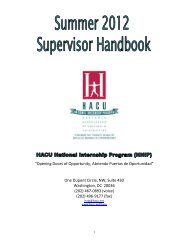NATIONAL HISPANIC LEADERSHIP AGENDA - maldef
NATIONAL HISPANIC LEADERSHIP AGENDA - maldef
NATIONAL HISPANIC LEADERSHIP AGENDA - maldef
You also want an ePaper? Increase the reach of your titles
YUMPU automatically turns print PDFs into web optimized ePapers that Google loves.
<strong>NATIONAL</strong> <strong>HISPANIC</strong><br />
<strong>LEADERSHIP</strong> <strong>AGENDA</strong><br />
2008 <strong>HISPANIC</strong> POLICY <strong>AGENDA</strong>
CONTENTS<br />
MESSAGE FROM THE CHAIR pg v<br />
ABOUT NHLA pg vii<br />
BOARD OF DIRECTORS pg xi<br />
MEMBER ORGANIZATIONS pg xiii<br />
NHLA <strong>AGENDA</strong> POLICY SUBCOMMITTEES pg xv<br />
INTRODUCTION pg 1<br />
EDUCATION pg 5<br />
CIVIL RIGHTS pg 11<br />
IMMIGRATION pg 17<br />
ECONOMIC EMPOWERMENT pg 21<br />
HEALTH pg 25<br />
2008 <strong>HISPANIC</strong> PUBLIC POLICY <strong>AGENDA</strong><br />
GOVERNMENT ACCOUNTABILITY pg 31<br />
MEMBER ORGANIZATIONS CONTACT INFORMATION pg 35<br />
ACKNOWLEDGEMENTS pg 37
MESSAGE FROM<br />
THE CHAIR<br />
August 2008<br />
On behalf of the 26 national Hispanic organizations comprising the National Hispanic Leadership<br />
Agenda (NHLA), I am pleased to present our platform. This platform, a product of<br />
meetings and input from Latino leaders and advocates from around the nation, focuses on<br />
civil rights, economic empowerment, education, government accountability, health and<br />
immigration not only from the perspective of what is good for the Latino community but<br />
what is essential for the nation’s future.<br />
Today, as Latinos account for one-sixth of the population on the mainland United States,<br />
Puerto Rico and the territories, every issue facing the Latino community has a national<br />
impact. Every family, every business and every community is touched by Latinos, whether we<br />
have resided here for generations or whether we are the newest of the newcomers. The<br />
NHLA agenda highlights policies and solutions in priority areas where federal government<br />
policy can make a difference in the lives of members of our communities. These policies do<br />
not simply “serve” the community, they enable the Latino community to better serve the<br />
nation and to fulfill their own dreams and aspirations for a better life.<br />
This year will be a watershed year for Latinos in the election. We have candidates and parties<br />
that are seeking the Latino vote and the Latino vote is likely to be decisive in a number of the<br />
swing states in the presidential election. Whichever candidate is elected has a responsibility,<br />
with Congress, to uplift and advance the Hispanic community and the nation. The NHLA<br />
Policy Agenda presents a pathway forward. Whatever the outcome of the election, NHLA<br />
organizations will work with the new Administration making the case for policies and<br />
programs that better the lives of Latinos, and we will identify Latinos for key appointed<br />
positions in the next administration. In addition, we will identify key posts where the<br />
decisions made have a special impact on our ability to succeed as a community and as a<br />
nation. Whoever is appointed to those positions must have an understanding, appreciation<br />
and sensitivity to the contributions and needs of Latinos.<br />
TABLE OF CONTENTENTS<br />
Here is our agenda for our nation and our future. We call upon elected officials, candidates,<br />
political parties, the media and the general public to consider and adopt this Agenda and<br />
ensure that the interests of the Latino community for the betterment of the nation are carried<br />
out. Join us in that effort.<br />
Sincerely,<br />
v<br />
John Trasviña<br />
Chair
ABOUT NHLA<br />
THE <strong>NATIONAL</strong> <strong>HISPANIC</strong> <strong>LEADERSHIP</strong> <strong>AGENDA</strong><br />
The National Hispanic Leadership Agenda (NHLA) was established in 1991 as a nonpartisan<br />
association of major Hispanic* national organizations and distinguished Hispanic leaders<br />
from all over the nation. NHLA’s mission calls for unity among Latinos around the country<br />
to provide the Hispanic community with greater visibility and a clearer, stronger influence<br />
in our country’s affairs. NHLA brings together Hispanic leaders to establish policy priorities<br />
that address, and raise public awareness of, the major issues affecting the Latino community<br />
and the nation as a whole. NHLA is composed of 26 of the leading national and regional<br />
Hispanic civil rights and public policy organizations and other elected officials, and prominent<br />
Hispanic Americans. NHLA coalition members represent the diversity of the Latino<br />
community – Mexican Americans, Puerto Ricans, Cubans, and other Hispanic Americans.<br />
The goals that guide the NHLA’s mission are:<br />
• To identify, examine, and form public policies on Latino issues based on a national<br />
consensus of Latino leaders.<br />
• To prepare and disseminate a consensus-based policy agenda that specifies the nature<br />
and scope of Latino concerns and needs throughout the country.<br />
• To promote greater awareness of, and attention to Latino concerns among the nation’s<br />
policy-makers, corporate America, civic community leaders, and the general public.<br />
ABOUT THE NHLA 2008 POLICY <strong>AGENDA</strong><br />
The NHLA 2008 Hispanic Policy Agenda is a comprehensive document that addresses prime<br />
policy issues facing Hispanics in six main issue areas:<br />
• Education<br />
• Civil rights<br />
• Immigration<br />
• Economic Empowerment<br />
• Health<br />
• Government Accountability<br />
2008 <strong>HISPANIC</strong> PUBLIC POLICY <strong>AGENDA</strong><br />
vii
BOARD OF<br />
DIRECTORS<br />
<strong>NATIONAL</strong> <strong>HISPANIC</strong> <strong>LEADERSHIP</strong> <strong>AGENDA</strong> BOARD OF DIRECTORS<br />
John Trasviña<br />
NHLA Chair<br />
Mexican American Legal<br />
Defense & Educational<br />
Fund<br />
Gabriela Lemus<br />
NHLA Vice Chair<br />
Labor Council for Latin<br />
American Advancement<br />
Alma Morales-Riojas<br />
NHLA Secretary/Treasurer<br />
MANA, A National Latina<br />
Organization<br />
Ronald Blackburn-Moreno<br />
Executive Committee<br />
ASPIRA Association, Inc.<br />
Janet Murguía<br />
Policy Committee Chair<br />
Executive Committee<br />
National Council of La Raza<br />
Dr. Juan Andrade Jr.<br />
U.S. Hispanic<br />
Leadership Institute<br />
Víctor Capellán<br />
Dominican American<br />
National Roundtable<br />
Dr. Yanira Cruz<br />
National Hispanic<br />
Council on Aging<br />
Guarione Diaz<br />
Cuban American<br />
National Council<br />
Angelo Falcón<br />
National Institute<br />
for Latino Policy<br />
Rafael Fantauzzi<br />
National Puerto Rican<br />
Coalition, Inc.<br />
Dr. Antonio Flores<br />
Hispanic Association of<br />
Colleges & Universities<br />
Marta Garcia<br />
National Hispanic<br />
Media Coalition<br />
Antonio González<br />
Southwest Voter Registration<br />
Education Project<br />
Augustine Martinez<br />
United States Hispanic<br />
Chamber of Commerce<br />
Antonio Gil Morales<br />
American GI Forum<br />
Gilbert Moreno<br />
Association for the<br />
Advancement of<br />
Mexican Americans<br />
Clara Padilla-Andrews<br />
National Association of<br />
Hispanic Publications<br />
Dr. Elena Ríos<br />
National Hispanic<br />
Medical Association<br />
Roger J. Rivera<br />
National Hispanic<br />
Environmental Council<br />
Lillian Rodríguez-López<br />
Hispanic Federation<br />
Ramona E. Romero<br />
Hispanic National<br />
Bar Association<br />
Rosa Rosales<br />
League of United Latin<br />
American Citizens<br />
2008 <strong>HISPANIC</strong> PUBLIC POLICY <strong>AGENDA</strong><br />
ix
BOARD OF<br />
DIRECTORS<br />
<strong>NATIONAL</strong> <strong>HISPANIC</strong> <strong>LEADERSHIP</strong> <strong>AGENDA</strong> BOARD OF DIRECTORS<br />
Felix Sánchez<br />
National Hispanic<br />
Foundation for the Arts<br />
Arturo Vargas<br />
National Association of<br />
Latino Elected and<br />
Appointed Officials<br />
Albert Zapanta<br />
United States-Mexico<br />
Chamber of Commerce<br />
Hon. Joe Baca<br />
(Individual Member)<br />
United States House<br />
of Representatives<br />
Rudy Beserra<br />
(Individual Member)<br />
The Coca-Cola Company<br />
Henry Cisneros<br />
(Individual Member)<br />
American City Vista<br />
Fred Fernandez<br />
(Individual Member)<br />
United Parcel Service<br />
2008 <strong>HISPANIC</strong> PUBLIC POLICY <strong>AGENDA</strong><br />
xi
MEMBER<br />
ORGANIZATIONS<br />
<strong>NATIONAL</strong> <strong>HISPANIC</strong> <strong>LEADERSHIP</strong> <strong>AGENDA</strong> MEMBER ORGANIZATIONS<br />
American GI Forum<br />
ASPIRA Association, Inc.<br />
Association for the<br />
Advancement of Mexican<br />
Americans (AAMA)<br />
Cuban American<br />
National Council (CNC)<br />
Dominican American<br />
National Roundtable<br />
(DANR)<br />
Hispanic Association of<br />
Colleges & Universities<br />
(HACU)<br />
Hispanic Federation<br />
Hispanic National Bar<br />
Association (NHBA)<br />
Labor Council for Latin<br />
American Advancement<br />
(LCLAA)<br />
League of United Latin<br />
American Citizens (LULAC)<br />
MANA, A National Latina<br />
Organization (MANA)<br />
Mexican American Legal<br />
Defense & Educational<br />
Fund (MALDEF)<br />
National Association of<br />
Hispanic Publications<br />
(NAHP)<br />
National Association of<br />
Latino Elected and<br />
Appointed Officials<br />
(NALEO)<br />
National Council of La Raza<br />
(NCLR)<br />
National Hispanic Council<br />
on Aging (NHCA)<br />
National Hispanic<br />
Environmental Council<br />
(NHEC)<br />
National Hispanic<br />
Foundation for the Arts<br />
(NHFA)<br />
National Hispanic Media<br />
Coalition (NHMC)<br />
National Hispanic Medical<br />
Association (NHMA)<br />
National Institute for Latino<br />
Policy (NiLP)<br />
National Puerto Rican<br />
Coalition, Inc. (NPRC)<br />
Southwest Voter<br />
Registration Education<br />
Project (SVREP)<br />
United States Hispanic<br />
Chamber of Commerce<br />
(USHCC)<br />
United States-Mexico<br />
Chamber of Commerce<br />
U.S. Hispanic Leadership<br />
Institute (USHLI)<br />
2008 <strong>HISPANIC</strong> PUBLIC POLICY <strong>AGENDA</strong><br />
xiii
NHLA POLICY<br />
SUBCOMMITTEES<br />
Janet Murguía, Chair<br />
President & CEO, National Council of La Raza (NCLR)<br />
EDUCATION COMMITTEE<br />
Ronald Blackburn-Moreno, Co-Chair<br />
President and CEO,<br />
ASPIRA Association, Inc.<br />
Dr. Antonio Flores, Co-Chair<br />
President, Hispanic Association of<br />
Colleges & Universities (HACU)<br />
Dr. Gumecindo Salas<br />
Vice President, Hispanic Association<br />
of Colleges & Universities (HACU)<br />
Peter Zamora<br />
Washington D.C. Regional Counsel,<br />
Mexican American Legal Defense<br />
& Educational Fund (MALDEF)<br />
CIVIL RIGHTS COMMITTEE<br />
Brent Wilkes, Chair<br />
Executive Director, Washington DC Office,<br />
League of United Latin American Citizens<br />
(LULAC)<br />
Dr. Juan Andrade Jr.<br />
President, U.S. Hispanic Leadership<br />
Institute (USHLI)<br />
Angela Arboleda<br />
Associate Director of Criminal Justice<br />
Policy, National Council of La Raza<br />
(NCLR)<br />
Raúl González<br />
Senior Legislative Director, National<br />
Council of La Raza (NCLR)<br />
Kery W. Núñez<br />
Legislative Director, National Puerto Rican<br />
Coalition, Inc. (NPRC)<br />
Claudia Alcaraz<br />
Strategic Initiatives Manager,<br />
National Puerto Rican Coalition, Inc.<br />
(NPRC)<br />
Hilda Crespo<br />
Vice President, ASPIRA Association, Inc.<br />
Javier Domínguez<br />
League of United Latin American Citizens<br />
(LULAC)<br />
Angelo Falcón<br />
President & Founder, National Institute<br />
for Latino Policy (NiLP)<br />
Marta Garcia<br />
Founder/Co-Chair, National Hispanic<br />
Media Coalition<br />
William Ramos<br />
Director, Washington D.C. Office,<br />
National Association of Latino Elected<br />
and Appointed Officials (NALEO)<br />
2008 <strong>HISPANIC</strong> PUBLIC POLICY <strong>AGENDA</strong><br />
xv
IMMIGRATION COMMITTEE<br />
Dr. Juan Andrade Jr.<br />
President, U.S. Hispanic Leadership<br />
Institute (USHLI)<br />
Raúl González<br />
Senior Legislative Director, National<br />
Council of la Raza (NCLR)<br />
Gabriela Lemus<br />
Executive Director,<br />
Labor Council for Latin American<br />
Advancement (LCLAA)<br />
ECONOMIC EMPOWERMENT COMMITTEE<br />
Augustine Martinez, Co-Chair<br />
President & CEO, United States Hispanic<br />
Chamber of Commerce (USHCC)<br />
Albert Zapanta, Co-Chair<br />
President & CEO, U.S.-Mexico Chamber<br />
of Commerce (USMCOC)<br />
Guarione Díaz<br />
President, Cuban American<br />
National Council (CNC)<br />
Augustine Martinez<br />
President & CEO,<br />
United States Hispanic Chamber of<br />
Commerce (USHCC)<br />
Brent Wilkes<br />
Executive Director, Washington D.C.<br />
Office, League of United Latin American<br />
Citizens (LULAC)<br />
Peter Zamora<br />
Washington D.C. Regional Counsel,<br />
Mexican American Legal Defense &<br />
Educational Fund (MALDEF)<br />
Alma Morales-Riojas<br />
President & CEO, MANA, A National<br />
Latina Organization (MANA)<br />
Gilbert Moreno<br />
President & CEO, Association for the<br />
Advancement of Mexican Americans<br />
Kery W. Núñez<br />
Legislative Director, National Puerto Rican<br />
Coalition, Inc. (NPRC)<br />
2008 <strong>HISPANIC</strong> PUBLIC POLICY <strong>AGENDA</strong><br />
Gabriela Lemus<br />
Executive Director,<br />
Labor Council for Latin American<br />
Advancement (LCLAA)<br />
Milton Rosado<br />
President, Labor Council for Latin American<br />
Advancement (LCLAA)<br />
xvii
HEALTH COMMITTEE<br />
Kery W. Núñez, Co-Chair<br />
Legislative Director, National Puerto Rican<br />
Coalition (NPRC)<br />
Dr. Elena Rios, Co-Chair<br />
President & CEO, National Hispanic<br />
Medical Association (NHMA)<br />
Dr. Yanira Cruz<br />
President & CEO, National Hispanic<br />
Council on Aging<br />
Alicia Díaz<br />
Director, Government Affairs<br />
& Legislative Policy, Cuban American<br />
National Council<br />
GOVERNMENT ACCOUNTABILITY COMMITTEE<br />
Lydia Camarillo, Co-Chair<br />
Vice-President, Southwest Voter<br />
Registration Education Project (SVREP)<br />
Alma Morales-Riojas, Co-Chair<br />
President & CEO, MANA A National<br />
Latina Organization (MANA)<br />
William Gil<br />
Hispanic Association of Colleges &<br />
Universities (HACU)<br />
Augustine Martinez<br />
President & CEO, United States Hispanic<br />
Chamber of Commerce (USHCC)<br />
Antonio Gil Morales<br />
American GI Forum<br />
William Ramos<br />
Director, Washington D.C. Office,<br />
National Association of Latino Elected<br />
and Appointed Officials (NALEO)<br />
Gabriela Lemus<br />
Executive Director, Labor Council for Latin<br />
American Advancement (LCLAA)<br />
Augustine Martinez<br />
President & CEO, United States Hispanic<br />
Chamber of Commerce (USHCC)<br />
Jennifer Ng’andu<br />
Associate Director, Health Policy Project,<br />
National Council of la Raza (NCLR)<br />
Roger Rivera<br />
President, National Hispanic<br />
Environmental Council<br />
Jimmie V. Reyna<br />
President, Hispanic National Bar<br />
Association (HNBA)<br />
Dr. Elena Ríos<br />
President, National Hispanic Medical<br />
Association (NHMA)<br />
Lillian Rodríguez-López<br />
President, Hispanic Federation<br />
Brent Wilkes<br />
Executive Director, League of United Latin<br />
American Citizens (LULAC)<br />
Peter Zamora<br />
Washington D.C. Regional Counsel,<br />
Mexican American Legal Defense &<br />
Educational Fund (MALDEF)<br />
Albert Zapanta<br />
President & CEO, United States-Mexico<br />
Chamber of Commerce<br />
2008 <strong>HISPANIC</strong> PUBLIC POLICY <strong>AGENDA</strong><br />
xix
INTRODUCTION<br />
The nation’s large and growing Hispanic community emerges ready to take center stage and<br />
be a decisive force in this year’s Presidential and Congressional elections. Everyday across<br />
the United States, Latinos touch the lives of every family, business and community. We call<br />
on presidential candidates, elected and government officials, civic and business leaders, and<br />
the media to hear our voices, understand our concerns and act on our priorities.<br />
Since 1992, the National Hispanic Leadership Agenda (NHLA) has come together on a quadrennial<br />
basis to present a platform on the major issues facing the Latino community and the<br />
nation as a whole. This platform is the product of deliberations by 26 of the leading national<br />
and regional Hispanic organizations that comprise the diverse membership of the NHLA.<br />
The Hispanic community is larger and more diverse than ever, numbering close to 50 million<br />
persons and making up over 16% of the combined population of the United States, Puerto<br />
Rico, and the United States territories. We continue, as a community, to have common<br />
concerns on education, civil rights, immigration, economic empowerment, health, and<br />
government accountability.<br />
Access to quality education is fundamental to integrating Hispanics into the larger society.<br />
Action on education by the next President and the next Congress will define the future for<br />
this and the next generation of Hispanics. From pre-school to post-secondary, education<br />
must have the resources, teachers, curriculum and priority to provide meaningful opportunities<br />
for Hispanic students to close academic achievement gaps and graduate from high<br />
school prepared for college, work, and life. Our students must be prepared to fill 21st century<br />
jobs in science, technology, engineering, mathematics, and other fields. As a backbone of<br />
Latino higher education, Hispanic Serving Institutions (HSI) should be made a higher<br />
national priority. Also, English language learners must be able to learn academic English<br />
without sacrificing their native language skills.<br />
2008 <strong>HISPANIC</strong> PUBLIC POLICY <strong>AGENDA</strong><br />
Over the past several years, the federal government has dramatically reduced enforcement<br />
of civil rights and liberties. This lack of enforcement has created a hostile environment<br />
towards Latinos and immigrants across the country. Latinos have faced discrimination from<br />
the mainstream media and as a consequence the number of hate groups formed and hate<br />
1
2008 <strong>HISPANIC</strong> PUBLIC POLICY <strong>AGENDA</strong><br />
crimes reported against Latinos has increased. Discrimination against Latinos continues<br />
to pervade throughout employment sites and the juvenile justice system. Civil rights<br />
enforcement begins by ensuring that the 2010 Census accurately account for the U.S. Latino<br />
population and ensuring that Latino voters are not disenfranchised.<br />
We are not all immigrants but we have come together to defend those who bear the brunt of<br />
over-reaching immigration enforcement, the harmful separation of families and lack of due<br />
process, and we speak out in favor of comprehensive immigration reform. As we stand<br />
united as a community in protecting our immigrant population that is so vulnerable, we are<br />
also resolute in protecting the civil rights of the majority of Latinos who are U.S. citizens and<br />
permanent residents.<br />
A vast percentage of Latino families that fall in the lower to middle income range have been<br />
affected by a weak U.S. economy. The Hispanic unemployment rate has risen and the current<br />
housing market crisis has led many Hispanic families to lose their homes. We must promote<br />
Latino economic development and empowerment both domestically and in Latin America.<br />
Hispanics continue to lack access to high quality healthcare, health insurance and preventative<br />
healthcare due to an inability to afford these services as well as the federal government’s<br />
inability to tailor programs to address unique issues that affect the Hispanic<br />
community. Latinos in low income neighborhoods are disproportionately more exposed to<br />
environmental hazards, which is a problem exacerbated by the current global warming crisis.<br />
Research studies focusing on opportunities to develop healthcare programs to benefit Latinos<br />
are scarce, in addition to the fact that the numbers of Hispanic healthcare professionals are<br />
underrepresented, at all levels of healthcare administration.<br />
Hispanics are also the most underrepresented minority group in the federal workforce<br />
despite the fact that Hispanics represent the fastest growing population in the country. As a<br />
result, issues and programs affecting the Hispanic community are rarely addressed. The<br />
federal government must ensure that its workforce reflects the face of America and it should<br />
also invest in Hispanic-owned businesses since they represent the fastest growing segment<br />
in the U.S. economy.<br />
2
As Hispanics are the second largest racial-ethnic group in the United States, virtually every<br />
issue is a Hispanic issue, but there are some issues in which the consequences of the<br />
government’s policies have a disproportionate impact on our community.<br />
This is no truer than in the wars in Iraq and Afghanistan. Latinos have honorably and<br />
valiantly served in the nation’s military throughout our history. A disproportionate number<br />
of Hispanics, whether U.S. citizens or not, have given their lives and have returned wounded<br />
in these wars. Because of the Latino community’s serious concerns about the wars in Iraq<br />
and Afghanistan, their impact on thousands of our families and on the government’s ability<br />
to make needed investments in our community and other domestic spending, the NHLA<br />
calls for the culmination of these wars in a way that is in the best interest of the country and<br />
our community.<br />
Looking beyond the election, NHLA will craft more extensive transition plans for the<br />
incoming administration. The NHLA will identify qualified Hispanic candidates for Cabinet,<br />
judicial and political appointments across the Administration and identify certain posts that<br />
we will expect appointees, Hispanic or not, to be knowledgeable and sensitive to our needs.<br />
Beginning in 2009, we will begin to aggressively promote the full participation of Latinos in<br />
the 2010 Census to assure that our communities receive fair federal funding and representation<br />
in the reapportionment and redistricting processes following 2010.<br />
There is no question that the Hispanic vote in the upcoming election will be more important<br />
than ever and decisive in some states. This NHLA Public Policy Agenda provides a blueprint<br />
to the urgent needs and aspirations of Hispanics and we offer it, and our votes, to the<br />
candidates who take it as their own. Presidential candidates and other aspirants for federal<br />
public office are urged to incorporate this information into their policy priorities to motivate<br />
Hispanics to support their candidacy.<br />
2008 <strong>HISPANIC</strong> PUBLIC POLICY <strong>AGENDA</strong><br />
3
EDUCATION<br />
There is no more important issue for the future and workforce competence of the Hispanic<br />
community than education. However, Hispanics have lacked the opportunities and access<br />
to a quality and comprehensive education that other groups enjoy. Sixty percent of Latinos<br />
have at least a high school diploma, compared to 89% of non-Latino Whites. Among those<br />
25 years and older, only 13.4% of Latinos have bachelor’s degrees compared to 30.6% of<br />
non-Latino Whites.<br />
EARLY CHILDHOOD EDUCATION<br />
Hispanic children are less likely than their African American and White peers to participate<br />
in early childhood education programs. While Latino children account for more than one in<br />
five (22%) of all children under the age of five, they are underrepresented in early childhood<br />
education programs. In 2005, 59% of White children participated in center-based preschool<br />
education programs, while only 43% of Hispanic children participated.<br />
Policy Recommendations:<br />
• Expand Early Head Start, Even Start and Head Start to include significantly higher<br />
numbers of Hispanic children, including increased services under the Migrant and<br />
Seasonal Head Start program.<br />
• Increase the number of preschool teachers who are culturally and linguistically<br />
competent to work with Hispanics and English Language Learners (ELLs), and the<br />
number of bilingual and bicultural proposal reviewers for Head Start programs.<br />
• Support proposals to assist school districts, especially Hispanic-Serving School Districts<br />
(HSSDs) that enroll 25% or more Hispanic students, develop high quality dual-language<br />
education programs for all Hispanic students, particularly ELLs.<br />
2008 <strong>HISPANIC</strong> PUBLIC POLICY <strong>AGENDA</strong><br />
STRENGTHENING THE PUBLIC ELEMENTARY AND SECONDARY EDUCATION SYSTEM<br />
Hispanics have the lowest achievement and attainment rates, and the highest dropout rate<br />
of any minority group.<br />
5
2008 <strong>HISPANIC</strong> PUBLIC POLICY <strong>AGENDA</strong><br />
Policy Recommendations:<br />
Reauthorize and strengthen implementation of the No Child Left Behind Act (NCLB):<br />
Accountability and Assessments<br />
o Ensure the inclusion of Hispanic and ELL students in the NCLB accountability<br />
system;<br />
o Promote high school graduation and address the Hispanic dropout rate;<br />
o Address the undercount of the Hispanic dropout rate as part of the NCLB<br />
account ability system and in determining adequate yearly progress (AYP);<br />
o Collect student data disaggregated by race, ethnicity, language status, migrant<br />
status, and Puerto Rico residence;<br />
o Fund and disseminate basic research in second language acquisition, including<br />
research on assessments for ELLs;<br />
o Ensure that federal special education referral and placement data is collected in a<br />
manner to uncover under- and over-identification of Hispanic students, including<br />
ELLs and improve special education evaluation processes to ensure that ELLs<br />
receive appropriate services; and<br />
o Use native-language or dual language assessments for students in bilingual<br />
programs in determining AYP and for providing ELL students with individual<br />
education plans, when appropriate.<br />
Teachers<br />
o Ensure that the teacher certification requirements under NCLB are enforced,<br />
especially in districts and schools with high concentrations of Latino students; and<br />
o Ensure that teachers of Latino students receive high quality professional<br />
development, especially in reading, mathematics and, for non-Latino teachers, in<br />
cultural competency.<br />
Resources<br />
o Fully fund all Hispanic-serving NCLB programs, especially Title I, Part A, Title III,<br />
Language Assistance State Grants and Bilingual Education programs; the<br />
6
Migrant Education Program; Even Start; Dropout Prevention; Parent Assistance<br />
Centers and After-School Programs; High School Equivalency Programs; College<br />
Assistance Migrant Program; and<br />
o Legislate and fund new programs intended to increase high school graduation<br />
rates, and approve dropout prevention bills submitted by Congressional<br />
Hispanic Caucus members.<br />
Parental Involvement and Adult Education<br />
o Strengthen the parental involvement provisions in NCLB to ensure adequate<br />
implementation of the law;<br />
o Ensure that Supplemental Educational Services and School Choice options are<br />
available to Hispanics, through improved outreach to Hispanic families;<br />
o Increase support for adult education programs, including English acquisition<br />
programs, for the larger number of Hispanics who have not graduated from high school;<br />
o Increase support for basic adult education and workforce competence programs<br />
across the federal government, including such programs as those in the<br />
Workforce Investment Act, and increase support for private adult education<br />
programs that benefit Hispanics; and<br />
o Ensure that charter schools are adequately supported and are capable of<br />
providing Hispanic children and their parents with a quality alternative to<br />
traditional public schools, and increase funding opportunities for charter<br />
school start-ups.<br />
Instructional Quality and School Climate<br />
o Increase the number of well qualified teachers who are prepared to help<br />
Hispanicand ELL students meet rigorous academic and graduation standards;<br />
o Provide for the training of existing school leaders (including superintendents<br />
and principals) and counselors to be culturally and linguistically competent to<br />
address the needs of Hispanic students;<br />
o Support “one-way” and “two-way” bilingual education programs;<br />
2008 <strong>HISPANIC</strong> PUBLIC POLICY <strong>AGENDA</strong><br />
7
2008 <strong>HISPANIC</strong> PUBLIC POLICY <strong>AGENDA</strong><br />
o Expand support for community-based organizations that provide education and<br />
counseling services to students in Latino communities; and<br />
o Enhance and support high quality vocational and technical education programs.<br />
Office for Civil Rights (OCR)<br />
o Require that the OCR be engaged in ensuring that the U.S. Department of<br />
Education’s policy positions meet federal civil rights standards; and<br />
o Increase OCR monitoring and vigorous enforcement of federal civil rights<br />
laws and regulations.<br />
HIGHER EDUCATION<br />
Hispanics currently have the lowest college matriculation and college graduation rates of<br />
any major population group. In 2007, 13.4% of Hispanics age 25 years and older had received<br />
a bachelor’s degree or higher, compared to 30.6% of comparable non-Hispanic Whites.<br />
In addition, in 2003, only 28.2% of Hispanic 12th graders had expectations of attaining<br />
a bachelor’s degree, compared to 35.1% of non-Hispanic White 12th graders. During the<br />
2004-2005 academic year, although the average amount of financial aid received by a<br />
Hispanic fulltime undergraduate was $4,622, White students received on average $4,837<br />
and African American students received $4,908 in financial aid.<br />
Policy Recommendations:<br />
Financial Aid<br />
o Double Pell Grant caps and increase the grants to loans ratio;<br />
o Lower student loan costs;<br />
o Support exemptions for federal loan default rate and create a newloan<br />
forgiveness program for low-income Hispanic students;<br />
o Support the DREAM Act to provide undocumented immigrant students with the<br />
opportunity to attend college and adjust their status; and<br />
o Support efforts to expand dissemination of information on financial aid to<br />
Hispanic families.<br />
8
Teacher Education<br />
o Establish a new teacher education program under Title II of the Higher<br />
Education Act of 1965 (HEA) to train new and more teachers that are culturally and<br />
linguistically competent in such areas as science, technology, engineering, and<br />
mathematics (STEM), bilingual education, non-English languages and other<br />
areas in which there are shortages;<br />
o Create incentives for Hispanic students to select teaching as a career through<br />
fellowships, loan forgiveness and federal support to school districts with a high<br />
number of Hispanic students;<br />
o Increase funding to Hispanic Serving Institutions (HSI) for teacher development<br />
and training to meet the education workforce needs of the pre-school and K-12<br />
education system; and<br />
o Establish and fund through legislation a National Hispanic Education<br />
Leadership Institute to train Hispanic principals, superintendents and HSI<br />
college faculty and presidents.<br />
HSI Executive Order<br />
o Establish by Executive Order a “President’s National Board of Advisors to<br />
Hispanic Serving Institutions” to strengthen the capacity of Hispanic Serving<br />
Institutions.<br />
Pre-College and College Support<br />
o Increase college preparation program funding for HSIs to engage in pre-college<br />
enrichment programs, including a new pre-collegiate program focusing on<br />
science, technology, mathematics and engineering training;<br />
o Increase funding for student support services, including the federal TRIO<br />
programs, and increase funding under TRIO for Hispanic non-profit<br />
organizations;<br />
o Increase the funding authorization level for HSIs under Title V to address both<br />
undergraduate and graduate education, faculty research, and outreach in two-<br />
2008 <strong>HISPANIC</strong> PUBLIC POLICY <strong>AGENDA</strong><br />
9
2008 <strong>HISPANIC</strong> PUBLIC POLICY <strong>AGENDA</strong><br />
and four-year colleges and universities;<br />
o Increase federal funding to agencies that support higher education teaching<br />
research and outreach programs (e.g., Department of Energy, Department of<br />
Agriculture, NSF, NASA) and ensure they increase funding to institutions<br />
serving Hispanic students;<br />
o Expand the Fund for the Improvement of Postsecondary Education (FIPSE),<br />
programs for international study by Hispanic students and faculty;<br />
o Increase opportunities for the recruitment of Latino faculty by colleges and<br />
universities;<br />
o Support policies that would increase Latino faculty in colleges and universities;<br />
o Increase the number of Hispanic students who attend four-year universities as<br />
well as two-year colleges;<br />
o Support policies that would increase Latino representation in top-tiered schools<br />
in collaboration with HSIs; and<br />
o Increase access to in-state tuition assistance to graduates of U.S. high schools,<br />
regardless of immigration status.<br />
Veterans<br />
o Expand education benefits for veterans, such as provided in the GI Bill Post-9/11<br />
Veterans Educational Assistance Act, for military on active duty since September<br />
11, 2001, who have served the nation so honorably (including activated reservists<br />
and National Guard members), a disproportionate number of who are Hispanic<br />
and who make the military strong.<br />
10
CIVIL RIGHTS<br />
The civil rights and liberties of the Latino community have never been at greater peril. The<br />
retreat by the federal government from rigorous and principled civil rights enforcement has<br />
reached a crisis and has contributed to the nation’s increasing blindness to its growing racialethnic<br />
disparities and prejudice. The FBI reports that hate crimes against Hispanics<br />
increased 35% since 2003, and more than 300 new anti-immigrant organizations have been<br />
formed during this period.<br />
2010 U.S. CENSUS<br />
An accurate and efficient 2010 U.S. Census and ongoing American Community Survey<br />
(ACS) that count all residents of the United States are of the highest priority for the Latino<br />
community. Data from the Census are indispensable to the enforcement of civil rights, the<br />
fair allocation of federal funding, and documenting the economic and social status of the<br />
Latino population.<br />
Policy Recommendations:<br />
• Issue and widely disseminate in the Latino community a written statement<br />
reaffirming the Census Bureau’s commitment to the full confidentiality of the<br />
personal information provided for the Census, including the legal protections involved;<br />
• Implement new and/or more effective protections (e.g., increased criminal penalties<br />
for misuse of Census data or for interference in data gathering and security processes;<br />
prohibition of the use of Census data by other government agencies for purposes other<br />
than those previously authorized);<br />
• Mandate that Immigration and Customs Enforcement (ICE) suspend raids during the<br />
2010 Census to ensure full Latino participation;<br />
• Show greater flexibility in the hiring of legal non-citizens as enumerators and other<br />
staff in hard-to-enumerate areas with large concentrations of immigrants;<br />
• Hire greater numbers of Latino employees and advisors at all levels and program areas<br />
by the Census Bureau to address the problem of Latino underrepresentation (currently<br />
Latinos are less than 6% of the Census Bureau work force, despite being over 13% of<br />
the civilian labor force); and<br />
2008 <strong>HISPANIC</strong> PUBLIC POLICY <strong>AGENDA</strong><br />
11
2008 <strong>HISPANIC</strong> PUBLIC POLICY <strong>AGENDA</strong><br />
• Develop a creative and adequately funded communications strategy to reach Latino<br />
immigrant and U.S.-born Latino communities, including Puerto Rico.<br />
HATE SPEECH IN MEDIA AND HATE CRIMES<br />
The amount of ugly rhetoric against undocumented Latinos on radio and television has increased<br />
significantly in recent years. It has demonized Latino citizens and immigrants alike.<br />
Policy Recommendations:<br />
• The Federal Bureau of Investigation and the Department of Justice must prioritize the<br />
investigation and prosecution of hate crimes against Latinos;<br />
• Pass the Local Law Enforcement Hate Crimes Prevention Act to strengthen the ability<br />
of law enforcement officials to investigate and prosecute the more than 9,000 biasmotivated<br />
violent crimes reported each year;<br />
• Support the efforts to secure an update of the 1993 National Telecommunications and<br />
Information Administration’s (NTIA) Report to Congress: “The Role of<br />
Communications in Hate Crimes”;<br />
• The Federal Communications Commission (FCC) must promote greater media<br />
ownership diversity to address the problem of Latinos currently owning less than 3% of<br />
television and radio stations by establishing a Female and Minority Task Force and the<br />
reinstatement of minority media tax certificates; and<br />
• Encourage that the Telecommunications Act of 1996 be amended to include broadcast<br />
content rules beyond its current scope that will protect foreseeable harm to Latinos and<br />
the general public.<br />
VOTING RIGHTS<br />
For American democracy to function effectively, all eligible voters must be allowed to participate<br />
in elections. Minority communities are often subject to discrimination as they organize<br />
politically and begin to make new political gains, however, Latino voters have increasingly<br />
become targets of voter suppression in recent years. This November, a record number of<br />
more than 9 million Latinos are expected to vote, making over 6% of the U.S. electorate.<br />
12
However, the voter turnout rate for Hispanic citizens was only 32% in 2006, compared to 52%<br />
for non-Hispanic White citizens.<br />
The NHLA opposes laws that require proof of citizenship for voter registration and/or voter<br />
identification at the polling place. Such laws, which purport to address “voter fraud,”<br />
discriminate against Latino and other minority voters who lack documents (e.g., passports)<br />
necessary to prove identity and/or citizenship. While there is no evidence that “voter fraud”<br />
has ever had a substantial impact upon a U.S. election, there is strong evidence that voter<br />
identification and proof of citizenship laws disenfranchise many Latino citizens. The NHLA<br />
supports voting reforms that increase Latino voters’ access to democracy.<br />
Policy Recommendations:<br />
• Remove partisanship from the Department of Justice (DOJ) Civil Rights Division<br />
hiring process – the Voting Section must hire and retain attorneys and experts who are<br />
experienced and committed to protecting minority voting rights;<br />
• Vigorously enforce the Voting Rights Act and other federal statutes that protect<br />
minority voters – the enforcement of Sections 2, 5, 203, and 4(f)4 of the Voting Rights<br />
act is particularly critical to Latino voters; and<br />
• Oppose voter identification and proof of citizenship laws, and support reforms that<br />
increase Latino voters’ access to democracy.<br />
EMPLOYMENT DISCRIMINATION<br />
The Latino community is strongly opposed to the reduced federal enforcement of Title VII<br />
of the Civil Rights Act, especially as it relates to actions on behalf of Latino employees. Under<br />
the Bush Administration, the Department of Justice (DOJ) and the Equal Employment<br />
Opportunity Commission (EEOC) have severely limited enforcement activities that protect<br />
Latino employees from workplace discrimination.<br />
2008 <strong>HISPANIC</strong> PUBLIC POLICY <strong>AGENDA</strong><br />
Policy Recommendations:<br />
• Support efforts to ensure that the DOJ and the EEOC aggressively pursue violations of<br />
civil rights employment laws;<br />
13
2008 <strong>HISPANIC</strong> PUBLIC POLICY <strong>AGENDA</strong><br />
• Oppose employment verification systems that lead to increased and unnecessary<br />
burdens on employers and workers and potentially increases discrimination against<br />
work-eligible Latino employees; and<br />
• Civil rights enforcement agencies must hire and retain well-qualified attorneys and<br />
experts who are committed to enforcing anti-discrimination laws and regulations.<br />
CRIMINAL JUSTICE<br />
Hispanics’ disproportionate overrepresentation in correctional institutions is a phenomenon<br />
that is often overlooked. Widespread discrimination in the criminal justice system, coupled<br />
with poor educational opportunities, increases Hispanics’ likelihood of incarceration. There<br />
are 283,000 Hispanics in federal and state prisons and local jails, making up slightly over<br />
15% of the inmate population. Nationally, in state prisons and local jails, Hispanics are<br />
incarcerated at nearly twice the rate of Whites, while in some states the rate is much higher<br />
(e.g., seven times higher in Connecticut and Pennsylvania and six times higher in Massachusetts<br />
and North Dakota).<br />
Policy Recommendations:<br />
• Review sentencing guidelines, which may contribute to racial disparities in<br />
punishment for crimes. Assess judges’ discretion in applying sentencing guidelines to<br />
detect and address racial inequalities in the criminal justice system;<br />
• Review and quantify court decisions in regards to ethnicity to employ effective policies<br />
that will reduce bias within the U.S. legal system. Create legislation that will provide<br />
Hispanics with adequate, culturally competent legal representation;<br />
• Legislative reform must take place to diminish policies that make it legal for authorities<br />
to practice racial profiling. Create legislation that cracks down on and reprimands<br />
authorities involved in racial profiling; and<br />
• Take into serious account claims of police and correctional officer abuse in order to<br />
implement a comprehensive policy. Implement policies that will make police and<br />
correctional authorities accountable for their abuses.<br />
14
LANGUAGE AND INTEGRATION<br />
The Latino community strongly opposes the increasing hostility toward the protection of the<br />
civil rights of language minorities and efforts to establish English as the national or official<br />
language. About 20% of Hispanics between ages 5 and 18 do not speak English very well,<br />
compared to less than 2% of non-Latino Whites, making this an important issue for the<br />
Latino community.<br />
Policy Recommendations:<br />
• Support policies that increase resources for English language acquisition and new<br />
American integration programs;<br />
• Oppose national legislation or state or local laws establishing English as the official or<br />
national language as they are unnecessary, harmful, and conflict with the constitutional<br />
rights of citizens and non-citizens alike;<br />
• Support “English-Plus” legislation that celebrates the country’s multiculturalism and<br />
multilingualism and enhances our global competitiveness; and<br />
• Oppose attempts to limit or eliminate civil rights protections for language minorities.<br />
JUDICIARY<br />
A fair and independent judiciary is critical for the preservation of Latino civil rights. However,<br />
despite being 16% of the population, Hispanics make up less than 4% of the state and federal<br />
judiciary. As the Latino population continues to grow, the need to protect the civil rights of<br />
the community will continue to increase.<br />
2008 <strong>HISPANIC</strong> PUBLIC POLICY <strong>AGENDA</strong><br />
Policy Recommendations:<br />
• Nominate and confirm judges who champion expansive interpretations of civil rights<br />
legal protections; and<br />
• Nominate and confirm judges who reflect the growing diversity of the country.<br />
15
2008 <strong>HISPANIC</strong> PUBLIC POLICY <strong>AGENDA</strong><br />
UNITED STATES COMMISSION ON CIVIL RIGHTS<br />
Created by the Civil Rights Act of 1957, the U.S. Commission on Civil Rights has served as<br />
a critical civil rights investigation, monitoring, and research tool for much of its history. In<br />
recent years, however, the Commission has been captured by partisan ideologues who are<br />
using the Commission to advance positions in opposition to civil rights.<br />
Policy Recommendation:<br />
• Restore balance to the Commission and ensure that it fulfills its critical role as a key<br />
investigation and monitoring tool for civil rights.<br />
PUERTO RICO’S SELF-DETERMINATION<br />
The NHLA supports the self-determination of the people of Puerto Rico in deciding their<br />
future political status.<br />
16
IMMIGRATION<br />
Of the close to 50 million Latinos in the United States, 37% are foreign-born. Federal immigration<br />
law and policy, therefore, is a top concern of the Latino community in the 2008<br />
election season. U.S. immigration laws and policies respecting immigration must reflect<br />
a commitment to human and civil rights.<br />
COMPREHENSIVE IMMIGRATION REFORM<br />
NHLA stands with the strong majority of Americans in urging prompt federal action in<br />
enacting comprehensive immigration reform to restore the rule of law to the nation’s immigration<br />
system and strengthen our commitment to basic fairness, opportunity for all, and<br />
equal treatment under the law.<br />
Policy Recommendations:<br />
• Enable the 12 million undocumented people in our country to come forward, attain<br />
legal status, learn English and assume the rights and responsibilities of citizenship<br />
while creating smart and secure borders that enhance national security;<br />
• Crack down on unscrupulous employers and take away incentives for hiring<br />
undocumented workers;<br />
• Strengthen legal channels that reunite families and allow workers to enter with the<br />
rights and protections that safeguard our workforce; and<br />
• Enact proactive measures to advance the successful integration of new immigrants<br />
into our communities.<br />
STATE AND LOCAL ENFORCEMENT OF FEDERAL IMMIGRATION LAWS<br />
The NHLA strongly objects to state and local law enforcement of immigration laws, either<br />
on their own or delegated by the federal government pursuant to Section 287(g) agreements<br />
that delegate authority for enforcing federal immigration law to state and local law enforcement<br />
officials. According to the Department of Homeland Security (DHS), as of March 10,<br />
2008, there are 41 active 287(g) agreements and more than 660 officers have been trained and<br />
certified to enforce federal immigration law.<br />
2008 <strong>HISPANIC</strong> PUBLIC POLICY <strong>AGENDA</strong><br />
17
2008 <strong>HISPANIC</strong> PUBLIC POLICY <strong>AGENDA</strong><br />
The approval of 287(g) agreements in such anti-immigrant areas has led to numerous reports<br />
of likely civil rights violations. In addition, local police enforcement of immigration laws<br />
inhibit cooperation between law enforcement and communities.<br />
Policy Recommendations:<br />
• DHS must impose a moratorium upon DHS approval of 287(g) agreements; and<br />
• The Department of Justice Special Litigation Section must review the civil rights<br />
training currently provided pursuant to these agreements and develop mechanisms<br />
to limit the impact of these agreements upon civil rights.<br />
PROTECT FAMILIES FROM IMMIGRATION RAIDS<br />
To terrorize and attempt to deport millions of people who have lived in and contributed to<br />
this country for most of their lives is not only inhumane but also impractical. Moreover,<br />
these raids have devastating social and economic effects in the community at large.<br />
Policy Recommendations:<br />
• Support family reunification as a cornerstone of U.S. immigration policy, which is<br />
consistently jeopardized as families are separated from their loved ones; and<br />
• Stop immigration raids and deportations that jeopardize public safety.<br />
DEVELOPMENT, RELIEF AND EDUCATION FOR ALIEN MINORS ACT (DREAM ACT)<br />
Each year, approximately 65,000 students see their dreams to attain higher education, serve<br />
in the military, or pursue other aspirations come to an abrupt halt as their immigration status<br />
prevents them from having access to several opportunities. Despite the contentious debate<br />
over Comprehensive Immigration Reform, the DREAM Act has garnered bipartisan backing<br />
and has the support of the House and Senate leadership.<br />
Policy Recommendations:<br />
• Approve the DREAM Act to allow promising, talented, ambitious and law-abiding<br />
undocumented students to have access to higher education, the armed services and<br />
18
legal employment; and<br />
• Prevent the victimization of immigrant youth through policies that push them into the<br />
shadows or force them to return to a land that they barely know.<br />
EMPLOYMENT VERIFICATION SYSTEMS<br />
NHLA expresses its strong opposition to the Department of Homeland Security's Social<br />
Security No-Match initiative. If this harmful program is implemented, 160,000 workers<br />
would lose their jobs immediately and millions more would be forced to navigate an inefficient<br />
government bureaucracy in order to prove their eligibility to work.<br />
Policy Recommendations:<br />
• NHLA opposes employment verification systems that do not meet accuracy rates and<br />
are not ready to pass the demonstration stage; and<br />
• NHLA opposes all employment verification proposals that require verification under<br />
uncertain conditions and would ultimately place an unreasonable burden on<br />
employers, workers, and the economy.<br />
NATURALIZATION DELAYS & BACKLOGS<br />
In July 2007 USCIS increased naturalization application fees from $400 to $675. Because of<br />
this increase there has been a dramatic increase in naturalization applications since 2006.<br />
By the end of 2007, the number of applications filed was the highest annual number in<br />
a decade at 1.4 million applications, and the third highest in our nation’s history. As a<br />
consequence, there has been an enormous backlog that has extended the processing period<br />
of applications.<br />
2008 <strong>HISPANIC</strong> PUBLIC POLICY <strong>AGENDA</strong><br />
Policy Recommendations:<br />
• Expedite elimination of the naturalization backlog; and<br />
• Rescind fee increases.<br />
19
2008 <strong>HISPANIC</strong> PUBLIC POLICY <strong>AGENDA</strong><br />
PROTECT WORKERS FROM DISCRIMINATION AND WRONGFUL TERMINATION<br />
The Department of Justice Office of Special Counsel for Immigration-Related Unfair<br />
Employment Practices (OSC) is responsible for enforcing the anti-discrimination provisions<br />
of the Immigration and Nationality Act (INA) which protect U.S. citizens and legal immigrants<br />
from employment discrimination based upon citizenship or immigration status and<br />
national origin. Despite a significant increase in worksite enforcement of immigration laws,<br />
there has been no corresponding increase in civil rights enforcement from OSC.<br />
Policy Recommendations:<br />
• Ensure that OSC has the resources necessary to fulfill its mission to protect authorized<br />
workers from certain discriminatory employment actions; and<br />
• Ensure that OSC engages in significant outreach, community education, and<br />
enforcement actions necessary to ensure that Latinos are protected from unlawful<br />
discrimination.<br />
20
ECONOMIC<br />
EMPOWERMENT<br />
Lower and middle income families are much more vulnerable to rough economic times and<br />
income loss because they have higher debt loads and are seeing the value of their homes<br />
plummet. The economic well being of underserved and Hispanic communities is a critical<br />
component in the social equality of our nation.<br />
NHLA supports the role of promoting economic development not just at home, but also<br />
abroad in our hemisphere. In addition, we support the strengthening of the relationship<br />
between the United States and Latin America. Efforts to encourage economic development,<br />
ameliorate poverty, and foment socio-economic investments such as those contained in<br />
legislation by Senators Martinez and Menendez are the clearest ways to reduce poverty and<br />
in so prevent political repression.<br />
LOW INCOME FAMILIES<br />
Half of Latino households had incomes of less than $38,000, compared to only 29% of non-<br />
Hispanic White households. Almost half (48%) of Latinos working earn $20,000 or less a<br />
year, compared to 34% of non-Hispanic Whites. The poverty rate for Latinos is 22% compared<br />
to 9% for non-Hispanic Whites.<br />
Policy Recommendations:<br />
• Support legislative efforts at the national, state and local levels that support low and<br />
middle income families, encourage workforce participation and promote a healthy,<br />
productive workforce and economy; and<br />
• Extend sick leave benefits for all workers* as well as job training and education<br />
programs targeted at low and middle income workers to help businesses meet skill<br />
shortages, increase productivity, and retain workers.<br />
2008 <strong>HISPANIC</strong> PUBLIC POLICY <strong>AGENDA</strong><br />
____________________________<br />
* Please note that the United States Hispanic Chamber of Commerce, a member of NHLA, does<br />
not support extension of mandatory sick leave legislation.<br />
21
2008 <strong>HISPANIC</strong> PUBLIC POLICY <strong>AGENDA</strong><br />
<strong>HISPANIC</strong> HOMEOWNERSHIP<br />
NHLA promotes the goal of Hispanic homeownership. Only 49% of Latinos are homeowners,<br />
compared to 74% of non-Hispanic Whites. We are also concerned that the current crisis<br />
in the housing market will result in families seeing a reduction in their assets or net worth,<br />
and too many families may either lose their home or fall prey to market conditions that<br />
require them to sell their home.<br />
Policy Recommendations:<br />
• Promote and fund expanded efforts into affordable housing;<br />
• Expand financial literacy education to Hispanic communities, including non-English<br />
speaking households;<br />
• Support prescriptive relief to those most likely to face foreclosure, including those with<br />
subordinated debt based on their homes, including reform or regulation of the<br />
servicing industry to ensure that refinancing and financial hardship adjustments are<br />
done appropriately and ethically;<br />
• Leverage investments in order to best allow local communities to develop vacant or<br />
foreclosed properties; and<br />
• Revisit the harmful bankruptcy reforms that have placed too many Hispanic<br />
households at a disadvantage of protecting their homes and assets when it becomes<br />
necessary to declare bankruptcy.<br />
UNEMPLOYMENT BENEFITS<br />
The slowdown and potential contraction in the U.S. economy has resulted in the loss of hundreds<br />
of thousands of jobs and analysts expect the trend to continue. The unemployment rate<br />
for Hispanics in the U.S. rose to 6.5% in the first quarter of 2008, well above the 4.7% rate<br />
for all non-Hispanics.<br />
Many Latinos who become unemployed due to recessionary forces will not meet state<br />
eligibility requirements for unemployment insurance (UI) benefits. Two critical aspects of<br />
eligibility for UI are earnings and/or a consistent work history: many low-income Latino<br />
22
workers do not make enough money to qualify or have been in and out of a job at such rates<br />
that they become ineligible.<br />
Policy Recommendations:<br />
• Extend and expand the access and timeframe for unemployment benefits to workers,<br />
including those who are currently not eligible by allowing a workers’ most recent wages<br />
to be considered in determining eligibility and benefit amount.<br />
JOB TRAINING<br />
Policy Recommendations:<br />
• Even in the current economic climate, various sectors of the economy are adding jobs.<br />
Good-quality jobs await well prepared workers, especially in industries such as green<br />
technology and renewable energy;<br />
• Job training initiatives must be adequately equipped and programmatically flexible to<br />
connect workers with Limited English Proficiency to good-quality jobs and to train<br />
themto be competitive candidates for employment;<br />
• Increased federal funding for successful job training programs in growing industries<br />
to correct workforce mismatches in the short term and propel traditionally underserved<br />
workers into well-paying jobs in high demand areas of the labor market;<br />
• Research and demonstration projects should be expanded to include integrated<br />
training, especially in states and localities where the demand for English language<br />
assistance is high; and<br />
• Reauthorize and expand Trade Adjustment Assistance.<br />
2008 <strong>HISPANIC</strong> PUBLIC POLICY <strong>AGENDA</strong><br />
INVESTING IN ECONOMIC GROWTH FOR THE U.S., INCLUDING PUERTO RICO<br />
Policy Recommendations:<br />
• Award and expand incentives to domestic manufacturing in order to improve our<br />
economy and labor force (e.g., Manufacturing Extension Partnership Program); and<br />
23
2008 <strong>HISPANIC</strong> PUBLIC POLICY <strong>AGENDA</strong><br />
• Expand the Work Opportunity Tax Credit, which provides tax credits to employers that<br />
hire from targeted disadvantaged groups by expanding to include all other members of<br />
an underserved community.<br />
ENDING FOOD INSECURITY<br />
Policy Recommendations:<br />
• Increase food stamp allotments by at least 20% in the short term, and take steps to<br />
ensure that the minimum - rather than the maximum allotments - are based upon the<br />
Thrifty Food Plan. In addition, NHLA supports including Puerto Rico equitably within<br />
the Food Stamp Program;<br />
• The Farm Bill of 2002 restored food stamp benefits to Legal Permanent Residents, but it<br />
was limited to those that have been LPRs for more than five years. NHLA believes the<br />
end goal is the full restoration of food stamp benefits to immigrants;<br />
• Education and outreach efforts to Hispanic households ought to be improved given the<br />
high rate of food insecurity in our community; and<br />
• Expansion of the summer food program especially on Latino communities.<br />
PAY AND GENDER EQUITY<br />
Policy Recommendations:<br />
• Support the promotion of gender equity and racial equality in the workplace, and<br />
develop assessments on remaining barriers and remedies; and<br />
• Ensure adherence to minimum wage, equal employment opportunity laws, family and<br />
medical leave, and promotion of child care.<br />
24
HEALTH<br />
The lack of access to quality health care, due to financial and non-financial barriers, has been<br />
a pervasive problem harming the Hispanic community. There are also certain diseases and<br />
conditions as well as social determinants of health, including socio-economic and built-in<br />
environment factors that affect the health status of the Hispanic population. Lastly, there<br />
are major issues such as lack of diversity in the health professions and regional issues that<br />
need to be a priority. Addressing issues of access to health care, prevention and population<br />
health, health professions, and research and data collection are critical to the health and well<br />
being of this rapidly growing population.<br />
ACCESS TO HEALTH CARE<br />
Latinos are more likely to report a fair or poor health status than non-Hispanic Whites: 13%<br />
of Latinos reported fair or poor health, compared to 8% of non-Hispanic Whites. In 2006, just<br />
40% of Hispanics were covered by employer-based insurance, compared to 66% of non-<br />
Hispanic Whites. At the same time, the health care system lacks adequate preventative,<br />
cultural and language services. These barriers to accessing health care and the disparity in<br />
the quality of care have created disastrous consequences for many Hispanics, exacerbating<br />
chronic diseases affecting this population. As the nation debates health care reform, it is<br />
critical that the proposed solutions address the unique issues of the Hispanic population.<br />
Policy Recommendations:<br />
• Provide financing mechanisms that improve affordability of health care for the<br />
Hispanic population. Existing systems such as employer-based health coverage need<br />
to bstrengthened in their own right in order to best serve the Latino population.<br />
Additionally, we need to explore new options outside of the current channels that<br />
give Latinos the ability and opportunity to access health care coverage, including<br />
bolstering the ability of small business to be able to provide health coverage;<br />
• Increase federal funding for Ryan White AIDS by 10%;<br />
• Improve access to health care for immigrants throughout the U.S., with a special<br />
emphasis on infrastructure of the U.S.-Mexico border;<br />
• Provide outreach and enrollment programs with promotoras (lay health workers) for<br />
Hispanics, immigrants, and workers on the U.S.-Mexico border;<br />
2008 <strong>HISPANIC</strong> PUBLIC POLICY <strong>AGENDA</strong><br />
25
2008 <strong>HISPANIC</strong> PUBLIC POLICY <strong>AGENDA</strong><br />
• Provide prevention programs in the community, especially in community health<br />
centers, where we call for improving prevention programs in clinics and Ryan<br />
White Centers;<br />
• Provide incentives for Spanish language services with reimbursement in Medicare,<br />
Medicaid, SCHIP, and pay for performance risk adjustments;<br />
• Mandate cultural competence training and adoption of CLAS standards (Culturally<br />
and Linguistically Appropriate Services) for health care providers and health<br />
professional students;<br />
• Provide health information technology adoption and utilization grants for<br />
physicians and clinics;<br />
• Conduct multimedia marketing campaigns and provide grant programs that focus<br />
on prevention;<br />
• Cover legal immigrant children under the Children’s Health Insurance Program(CHIP);<br />
• Provide equitable treatment under federal health care programs for Puerto Rico; and<br />
• Provide returning reservists and National Guard members from Iraq and Afghanistan<br />
and other Global War on Terrorism locations the same health care benefits as their<br />
active duty counterparts, especially since Latinos are serving in greater numbers in<br />
combat units than any other ethnic group, thus are being overly impacted by Killed-in-<br />
Action, Wounded and Post Traumatic Syndrome.<br />
POPULATION HEALTH<br />
A. Puerto Rico<br />
Historically, Puerto Rico has not been equitably included in many federal programs including<br />
Medicaid, CHIP, and Medicare. The Island government makes a great investment in health<br />
care, spending approximately $1.7 billion to cover one third of its population. Yet despite this<br />
investment, the federal Medicaid reimbursement is just over $250 million, covering a minute<br />
fraction of the actual costs. Similarly, the federal government under-funds Puerto Rico’s hospitals<br />
and sets aside money for children’s health without taking into consideration actual<br />
need. Without federal support, it is difficult for Puerto Rico to sustain its health care system.<br />
26
Policy Recommendations:<br />
• Eliminate the Medicaid cap. Until the cap is eliminated provide federal funds for all<br />
major health initiatives outside of the cap;<br />
• Provide equitable inclusion of Children’s Health Insurance Program funds according<br />
to the national formula, as opposed to the current inequitable block grant;<br />
• Provide hospitals on the Island the national Medicare formula (100% federal payment)<br />
as opposed to the “blended” lower rate of 75% federal contribution/25% local formula;<br />
• Correct the Medicare Disproportionate Share Hospital formula, which severely<br />
underestimates the number of low-income patients, therefore reducing Puerto Rico’s<br />
qualifications for DSH payments;<br />
• Provide federal support for medical facilities for the patient population in severely<br />
underserved areas such as Vieques, a former U.S. naval training range with only one<br />
severely limited health care facility; and<br />
• Increase federal oversight of Ryan White AIDS money disbursed in Puerto Rico.<br />
B. Comprehensive Population Health Approach<br />
Eliminating health disparities and improving the health of Hispanics requires a population<br />
health approach beyond focusing on the health status of the individuals. It is necessary to<br />
consider the social, economic, cultural, and environmental conditions, as well as the places<br />
we live, work and play and to recognize the importance of the design of healthy public policy<br />
from sectors beyond public health – housing, transportation, labor, commerce, treasury,<br />
agriculture and education.<br />
Policy Recommendations:<br />
• Develop leadership training and conferences for government and private sector leaders<br />
on the population approach to policy development for healthy Hispanic communities;<br />
• Develop incentives for policies in communities, media, housing, transportation,<br />
schools, and the health care system that increase prevention of diseases, including<br />
heart disease, cancer, diabetes, obesity, HIV/AIDS and infectious diseases,<br />
environmental and occupational diseases, asthma, and mental illness; and<br />
• Review and establish policies focused on eliminating childhood obesity with schools,<br />
2008 <strong>HISPANIC</strong> PUBLIC POLICY <strong>AGENDA</strong><br />
27
2008 <strong>HISPANIC</strong> PUBLIC POLICY <strong>AGENDA</strong><br />
media, business, communities and healthcare providers.<br />
C. Environmental Health<br />
The health impacts on Latinos in the U.S., including Puerto Rico, from instances of environmental<br />
injustice continue unabated. Latinos are more likely to be exposed to environmental<br />
hazards such as poor air quality related to smokestacks; lead exposure from paint; working<br />
conditions with excessive exposure to chemicals/pesticides/herbicides and others, which in<br />
turn lead to other chronic conditions and disabilities. To exacerbate matters, global warming,<br />
which causes natural disasters and is expected to produce a rise in infectious and water borne<br />
diseases, such as dengue fever, malaria, and more, again will have distinct and disproportionate<br />
public and environmental health impacts on Latinos.<br />
Policy Recommendations:<br />
• Include a set-aside for affected communities in any programs designed to provide<br />
companies incentives to reduce emissions; and<br />
• Provide educational resources to low-income and communities of color on<br />
environmental hazards that affect them, including funding to Community-Based<br />
Organizations (CBOs) for outreach.<br />
DIVERSITY IN THE HEALTH PROFESSIONS<br />
There is a lack of bilingual, culturally competent health care professionals serving the<br />
Hispanic community resulting in a dire need to increase educational opportunities and<br />
promote health professions in minority communities. Latinos represent just 5.7% of physicians<br />
and surgeons, 4.2% of registered nurses, and 6.7% of physician assistants.<br />
Policy Recommendations:<br />
• Improve the recruitment process of Hispanic students starting with health career<br />
awareness, career pathway programs in K-12 and undergraduate education to expand<br />
the applicant pool for health professions schools and mentoring programs;<br />
• Provide funding to CBOs to conduct education programs for youth to promote the<br />
health professions early on in the educational pipeline;<br />
28
• Support initiatives to retain Hispanics in health care education programs;<br />
• Support efforts to increase Hispanics in all levels of health care administration;<br />
• Increase funding for Health Careers Opportunity Programs and Centers of Excellence<br />
(COE) programs;<br />
• Provide long term funding at appropriate levels to Hispanic regional COE programs;<br />
• Support comprehensive and long-term data collection on health professions graduates;<br />
and<br />
• Provide higher reimbursements, scholarships and loan repayments (e.g., National<br />
Health Service Corps., U.S. Public Health Service Commissioned Corps.) for health<br />
professionals who provide service in underserved areas.<br />
RESEARCH AND DATA COLLECTION<br />
Research and data collection are critical to understanding the complex health issues within<br />
the Hispanic community and for establishing health care policy. There is a lack of research<br />
on the health of the Hispanic population in regards to their assets and opportunities to<br />
develop improved health care programs. There is also a lack of comprehensive data by<br />
subgroup and inconsistent data collection in Puerto Rico for major federal health related<br />
reports. Currently, there appears to be no policy guiding federal health agencies about the<br />
inclusion or exclusion of Puerto Rico in federal surveys. Thus, data about the Island is often<br />
limited or left out altogether, making it hard, or at times even impossible, to define the needs<br />
of the patient population.<br />
Policy Recommendations:<br />
• Continue and expand support for the annual collection of health disparities data on<br />
racial and ethnic minorities through the Agency for Healthcare Research & Quality;<br />
• Improve data collection on Hispanic subgroups by country of origin and by lifespan.<br />
Ensure that “the SOL study” (epidemiologic cohort study of approximately 16,000<br />
Latinos of Cuban, Puerto Rican, Mexican and Central/South American origin) receives<br />
adequate funding;<br />
• Collect information specific to gender, ethnicity, and language preference;<br />
• Increase role of Hispanics as researchers and as participants in clinical trials;<br />
2008 <strong>HISPANIC</strong> PUBLIC POLICY <strong>AGENDA</strong><br />
29
2008 <strong>HISPANIC</strong> PUBLIC POLICY <strong>AGENDA</strong><br />
• Support for epidemiological study on prevalence of cancer rates among agricultural<br />
workers;<br />
• Standardize federal data collection. Any ongoing or new federally conducted or<br />
supported health surveys, studies or research that will aggregate data along state,<br />
Standard Metropolitan Statistical Areas or labor market lines should also include<br />
Puerto Rico;<br />
• Until legislation is passed on standardizing federal data collection, work towards the<br />
development and execution of Memorandum of Understanding between the Secretary<br />
ofHealth of Puerto Rico and HHS is necessary in order to outline a mutually agreed<br />
strategy for data collection relevant to Puerto Rico; and<br />
• Promote collaboration among researchers at NIH and Puerto Rico.<br />
30
GOVERNMENT<br />
ACCOUNTABILITY<br />
<strong>HISPANIC</strong>S IN THE FEDERAL WORKFORCE<br />
The systemic exclusion of Hispanics in the federal workforce as documented by the NHLA<br />
contributes to why Hispanics remain the only underrepresented group in the federal workforce.<br />
Despite being over 17% of the civilian workforce including Puerto Rico, Latinos make<br />
up less than 8% of the federal government workforce, making Hispanics the only underrepresented<br />
group. This is a persistent problem regardless of which party is in control of the<br />
White House that keeps the federal workforce from reflecting the face of America. The<br />
absence of Hispanics at all levels of the federal government shortchanges the government’s<br />
ability to produce policies that are inclusive, fair, and responsive to the concerns of the<br />
Hispanic community. As a result, Hispanics and issues and programs affecting those<br />
communities are either overlooked or managed ineffectively.<br />
The federal government has known but not planned for the projected mass exodus in<br />
retirements of the federal work force. Since Hispanics constitute the largest and exponentially<br />
growing minority population it would appear to be a perfect opportunity to both backfill positions<br />
and to commence a concentrated effort to change the paradigm from one of exclusion<br />
to one of inclusion. The federal government must work toward creating equal opportunities<br />
to remedy the historically severe underrepresentation of Hispanics in the federal workforce.<br />
Policy Recommendations:<br />
• Substantially increase the number of Hispanics in the federal workforce;<br />
• Enforce the Presidential Executive Order to increase Hispanic representation at all<br />
levels of the executive branch;<br />
• Adhere to a closely monitored performance-based review system to assess the<br />
progress of all agencies in recruiting, maintaining and promoting Hispanics, and use<br />
it as an evaluation tool for the promotion of managers;<br />
• Dramatically increase the number of Hispanics in the Senior Executive Service (SES);<br />
• Increase political appointments of Hispanics;<br />
• Increase judicial nominations of Hispanics at all levels;<br />
• Ensure continuous professional development and job training, especially in technology,<br />
for Hispanic women;<br />
2008 <strong>HISPANIC</strong> PUBLIC POLICY <strong>AGENDA</strong><br />
31
2008 <strong>HISPANIC</strong> PUBLIC POLICY <strong>AGENDA</strong><br />
• Increase Hispanic appointments to Boards and Commissions;<br />
• Establish partnerships with academic institutions, including Hispanic Serving<br />
Institutions, and create exchange programs for Hispanic faculty members;<br />
• Support and empower the role and functions of the Hispanic Employment<br />
Managers (HEP) Program to better accomplish its mission to advance employment<br />
opportunities for Hispanics as has been done successfully for women and African<br />
Americans;<br />
• Executive Agencies, in conjunction with the Office of Personnel Management,<br />
should train personnel officers on how to work with a multicultural workforce;<br />
• Increase veterans, military and military spouse employment; and<br />
• Institute and implement an aggressive pipeline of qualified and upwardly mobile<br />
Hispanics by fully utilizing the federal student programs, internships, and hiring<br />
flexibilities. Federal agencies need to invest in and maximize programs, as well as<br />
develop strategic partnerships with Hispanic organizations, that will facilitate the<br />
hiring of talent into the federal government such as the Federal Career Internship<br />
Program (FCIP) and the Student Career Internship Program (SCIP).<br />
<strong>HISPANIC</strong> BUSINESS PROMOTION, CONTRACTING AND GRANTS<br />
Hispanic-owned businesses now comprise one of the fastest-growing segments the U.S.<br />
economy. Between 1997 and 2002 (the year with the latest data), the number of businesses<br />
owned by Hispanics grew by 31% -- three times the national average for all businesses -- reaching<br />
1.6 million in 2002 and generating $222 billion in revenue. Nonetheless, less than 2% of<br />
investment went to Hispanic-owned businesses in the U.S. Small Business Administration’s<br />
main venture capital initiative, the Small Business Investment Company (SBIC) program.<br />
Policy Recommendations:<br />
• Support the reauthorization of the Small Business Administration programs and<br />
other related improvements to minority business promotion and federal<br />
procurement programs;<br />
• Support implementation of the Executive Order 13170 to ensure non-discrimination<br />
in federal procurement and expansion of the Small Disadvantaged Business Program<br />
32
(SDBs), 8(a), and Price Evaluation Adjustment to ensure that the federal government<br />
receives the best value for its contracts and to promote diversity to mitigate past<br />
inequalities in contracting to small businesses owned and controlled by socially and<br />
economically disadvantaged individuals;<br />
• Support improvements on critical issues such as contract bundling, increasing<br />
federal contracting goals for small business, size standard reform and improved<br />
enforcement, equal access to grants, and the reinstatement of the price evaluation<br />
adjustment program across all federal agencies;<br />
• Support reversing restrictions on the use of price evaluation adjustment for Small<br />
Disadvantaged Businesses (SDBs) at the Department of Defense;<br />
• Support H.R. 1873, the Small Business Fairness in Contracting Act, as the best effort<br />
towards reforming the federal marketplace for the benefit of minority entrepreneurs;<br />
• Advertise in Hispanic owned and bilingual publications to maximize outreach; and<br />
• Federal agencies need to invest in and maximize programs, as well as develop<br />
strategic partnerships with Hispanic businesses.<br />
2008 <strong>HISPANIC</strong> PUBLIC POLICY <strong>AGENDA</strong><br />
33
CONTACT<br />
INFORMATION<br />
NHLA MEMBER ORGANIZATIONS CONTACT INFORMATION<br />
American GI Forum<br />
1441 Eye (I) Street, Suite 810<br />
Washington, DC 20005<br />
Tel: (202) 289-6456; Fax: 289-6883<br />
www.americangiforum.org<br />
ASPIRA Association, Inc.<br />
1444 Eye (I) Street, N.W., Suite 800<br />
Washington, DC 20005<br />
Tel: (202) 835-3600; Fax: 835-3613<br />
www.aspira.org<br />
Association for the Advancement<br />
of Mexican Americans (AAMA)<br />
6001 Gulf Freeway B-1<br />
Houston, TX 77023<br />
Tel: (713) 926-4756; Fax: 926-8035<br />
www.aamainc.com<br />
Cuban American National Council<br />
1223 S.W. 4th Street<br />
Miami, FL 33135<br />
Tel: (305) 642-3484; Fax: 642-9122<br />
www.cnc.org<br />
Dominican American National<br />
Roundtable (DANR)<br />
1050 17th St. NW, Suite 600<br />
Washington, DC 20036<br />
Tel: (202) 238-0097<br />
www.danr.org<br />
Hispanic Association of Colleges<br />
& Universities (HACU)<br />
8415 Datapoint Drive, Suite 400<br />
San Antonio, TX 78229<br />
Tel: (210) 692-3805; Fax: 692-0823<br />
www.hacu.net<br />
Hispanic National Bar Association<br />
C/O The Marquez Law Group<br />
The Flood Building<br />
870 Market Street, Suite 1146<br />
San Francisco, CA 94104<br />
Tel: (415) 701-8808<br />
Web: www.hnba.com<br />
Labor Council for Latin American<br />
Advancement (LCLAA)<br />
815 16th Street, NW, 4th Floor<br />
Washington, DC 20006<br />
Tel: (202) 508-6919; Fax: 508-6922<br />
www.lclaa.org<br />
League of United Latin American Citizens<br />
(LULAC)<br />
2806 Fredericksburg Rd, #3<br />
San Antonio, TX 78201<br />
Tel: (214) 219-2133; Fax: 252-9052<br />
www.lulac.org<br />
MANA, A National Latina Organization<br />
1146 19th Street, N.W., Suite 700<br />
Washington, DC 20036<br />
Tel: (202) 833-0060; Fax: 496-0588<br />
www.hermana.org<br />
Mexican American Legal Defense &<br />
Educational Fund (MALDEF)<br />
634 S. Spring Street, 11th Floor<br />
Los Angeles, CA 90014<br />
Tel: (213) 629-2512; Fax: 629-8016<br />
www.<strong>maldef</strong>.org<br />
2008 <strong>HISPANIC</strong> PUBLIC POLICY <strong>AGENDA</strong><br />
35
2008 <strong>HISPANIC</strong> PUBLIC POLICY <strong>AGENDA</strong><br />
National Association of Hispanic<br />
Publications<br />
8201 Greensboro Dr., Suite 300<br />
McLean, VA 22102<br />
Tel: (703) 610-0205; Fax: 610-9005<br />
www.nahp.org<br />
National Association of Latino Elected<br />
and Appointed Officials (NALEO)<br />
1122 West Washington Blvd., 3rd Floor<br />
Los Angeles, CA 90015<br />
Tel: (213) 747-7606; Fax: 747-7664<br />
www.naleo.org<br />
National Council of La Raza (NCLR)<br />
1126 16th Street, NW,<br />
Washington, DC 20036<br />
Tel: (202) 785-1670; Fax: 776-1792<br />
www.nclr.org<br />
National Hispanic Council on Aging<br />
734 15th Street, NW, Suite 1050<br />
Washington, DC 20005<br />
Tel: (202) 347- 9733; Fax: 347-9735<br />
www.nhcoa.org<br />
National Hispanic Foundation<br />
for the Arts<br />
1010 Wisconsin Ave., NW, Suite 210<br />
Washington, DC 20007<br />
Tel: (202) 298-8308; Fax: 965-5252<br />
www.hispanicarts.org<br />
National Hispanic Media Coalition<br />
55 South Grand Avenue<br />
Pasadena, CA 91105<br />
Tel: (626) 792-6462; Fax: 792-6051<br />
www.nhmc.org<br />
National Hispanic Medical Association<br />
1411 K Street, N.W, Suite 200<br />
Washington, DC 20005<br />
Tel: (202) 628-5895; Fax: 628-5898<br />
www.nhma@earthlink.net<br />
National Institute for Latino Policy<br />
101 Avenues of the Americas, Suite 313<br />
New York, NY 10013<br />
Email: info@latinopolicy.org<br />
www.latinopolicy.org<br />
National Puerto Rican Coalition, Inc.<br />
1901 L Street, N.W., Suite 802<br />
Washington, DC 20036<br />
Tel: (202) 223-3915; Fax: 429-2223<br />
www.bateylink.org<br />
Southwest Voter Registration Education<br />
Project (SVREP)<br />
2914 N. Main Street, 2nd Floor<br />
Los Angeles, CA 90031<br />
Tel: (323) 343-9299; Fax: 343-9100<br />
www.svrep.org<br />
U.S. Hispanic Chamber of Commerce<br />
2175 K Street, NW, Suite 100<br />
Washington, DC 20037<br />
Tel: (202) 842-1212; Fax: 842-3221<br />
www.ushcc.com<br />
U.S.-Mexico Chamber of Commerce<br />
1300 Pennsylvania Avenue, NW,<br />
Suite 270<br />
Washington, DC 20004<br />
Tel: (202) 842-4328; Fax: 842-3283<br />
www.usmcoc.org<br />
U.S. Hispanic Leadership Institute<br />
431 S. Dearborn St., Suite 1203<br />
Chicago, IL 60605<br />
Tel: (312) 427-8683; Fax: 427-5183<br />
www.ushli.org<br />
36
The National Hispanic Leadership Agenda<br />
would like to give a special thanks to our<br />
OFFICIAL SPONSORS<br />
20FEB200406462039<br />
The Webb Group International<br />
2008 <strong>HISPANIC</strong> PUBLIC POLICY <strong>AGENDA</strong><br />
Additionally, Special Thanks to<br />
AltaVista Graphics<br />
Joaquín Andrade, Layout & Design<br />
Martha L. Álvarez<br />
The Raben Group LLC<br />
37
For more information about the National Hispanic Leadership Agenda, please contact:<br />
National Hispanic Leadership Agenda<br />
Peter Zamora<br />
C/O MALDEF<br />
1016 16th Street, N.W., Suite 100<br />
Washington, D.C. 20036<br />
Tel: (202) 293-2828



